Sketch of Public Policy Communion, May 2019Date: 2019-06-26
Section: Activity | 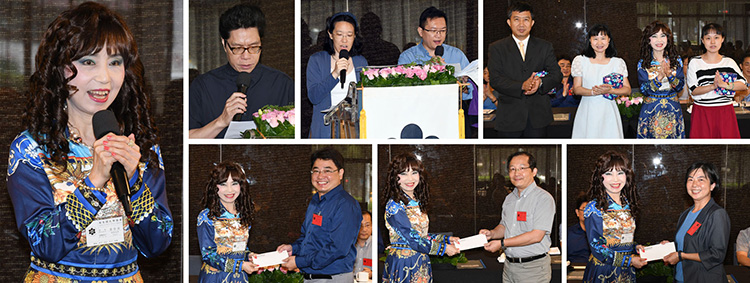
本會於2019年5月26日假台北喜來登大飯店一樓清翫廳舉行「祐生國政聯誼會」。在主持人黃晉英秘書長宣布後揭開當日活動序幕,在輕鬆、活潑的節目過後,隨即由主持人帶來重要訊息:「近來全球局勢紛擾不安,除了中美貿易大戰越演越烈,美國也對"華為"公司祭出禁購、禁售令,對於全球經濟造成很大的影響。因此,提醒大家投資前應該三思,以免受到波及。另外,祐生成員們皆擁有豐富的資源,大多屬於「Giver給予者」總是樂於分享,這也代表著我們有能力幫助別人,希望大家秉持著祐生奉獻的精神,使能促進社會的進步與成長。而祐生讀書會已開辦二十年,許多祐生成員已有足夠的社會歷練並且受到社會肯定,因此,經祐生特別審核通過即可轉任為不分科執守者,讓知識分享的層面更加多元。」
The May Archilife Public Policy Communion of 2019 was held on May 26, 2019. After a series of relaxing and fun activities, Secretary General Huang Chin-ying made the following announcement, "The global situation has recently become plagued with uncertainty. In addition to the intensification of the US-China trade war, the U.S. also imposed bans on the sale and purchase of Huawei products. The effect on the global economy has been profound. Everyone should therefore think carefully before they invest to avoid getting caught up in the storm. All Archilife members have a wealth resources, with most being "Giver" that enjoy sharing. We therefore have the power to help other people so we hope that everyone can uphold the Archilife spirit of giving in promoting social progress and development. The Archilife Book Assembly has been in operation for twenty years. Many Archilife members have now acquired sufficient social experience and status. For this reason, those that pass a special review by Archilife can be appointed as knowledge keepers so that knowledge can be shared on more diverse levels."
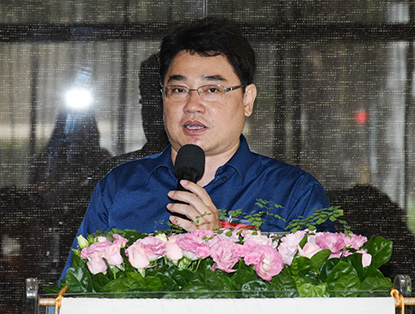 緊接著進行專題演講,由國政會委員王敏州先生主講「公投後台灣核能發電的困境」。主講人首先表示在通過「以核養綠」的公投案後,所面臨的困境包括核一、二廠兩部機目前均已超過延役申請期限且燃料池已滿,核三廠乾式貯存設施施工許可取得困難,以及核四廠重啟須突破重重瓶頸。而政策發展的困境包括政策議題複雜、資訊的不足、狹隘或過度簡化的解讀及社會信任不足,可試著透過資訊揭露、盤點爭議點及溝通來解決。主講人表示面臨各項變遷的台灣,物質文明收縮,精神文明擴張的洞見如果能適時導入台灣永續發展的政策,方向對了,可能解答就自然浮現了。 緊接著進行專題演講,由國政會委員王敏州先生主講「公投後台灣核能發電的困境」。主講人首先表示在通過「以核養綠」的公投案後,所面臨的困境包括核一、二廠兩部機目前均已超過延役申請期限且燃料池已滿,核三廠乾式貯存設施施工許可取得困難,以及核四廠重啟須突破重重瓶頸。而政策發展的困境包括政策議題複雜、資訊的不足、狹隘或過度簡化的解讀及社會信任不足,可試著透過資訊揭露、盤點爭議點及溝通來解決。主講人表示面臨各項變遷的台灣,物質文明收縮,精神文明擴張的洞見如果能適時導入台灣永續發展的政策,方向對了,可能解答就自然浮現了。
Next on the schedule was the keynote speech. First, Mr. Wang Min-chou spoke on "Challenges facing nuclear energy in Taiwan after the referendum". The presenter began by listing the challenges facing nuclear energy in the wake of the referendum on "using nuclear to nourish renewables" being passed. Nuclear Reactors No.1 and No.2 have both exceeded their application deadline for service life extensions, the difficulty of securing permission to construct dry storage facilities for Nuclear Reactor No.3, and the many obstacles in the way of re-commissioning Nuclear Reactor No.4. Challenges facing policy development include complex policy issues, inadequate information, narrow or simplistic interpretation, and a lack of public trust. It may be possible to resolve these problems through disclosure, inventory of disputes and communication. As Taiwan is now at the crossroads of change, the presenter suggested that concepts such as a contraction in the material civilization and expansion of the spiritual civilization can be introduced to the sustainability policies of Taiwan. The answers may very well present themselves once the right direction is found.
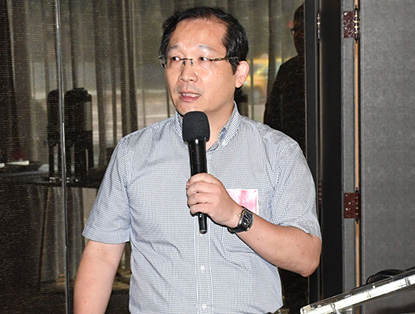 接著由國政會委員林芳銘先生主講「農林副資材的循環利用」。主講人首先表示林務局於2017年宣告迎向「國產材元年」,將振興人工林產業。樹木能吸收大量二氧化碳,而木材本身能夠良好的循環運用,目前的政策為天然林妥善保護,人工林永續利用。而農林產業剩餘資材,過往視為廢棄物焚燒處理,現今則發揮副資材的利用價值,發展出多層面的應用,包括做為木質顆粒燃料、生物炭、貓砂、肥料、3D列印線材等。另外,與民間公司單位鍊結進行產學合作,解決副資材運送的問題,促成循環利用,增加正面效益、提高附加價值。 接著由國政會委員林芳銘先生主講「農林副資材的循環利用」。主講人首先表示林務局於2017年宣告迎向「國產材元年」,將振興人工林產業。樹木能吸收大量二氧化碳,而木材本身能夠良好的循環運用,目前的政策為天然林妥善保護,人工林永續利用。而農林產業剩餘資材,過往視為廢棄物焚燒處理,現今則發揮副資材的利用價值,發展出多層面的應用,包括做為木質顆粒燃料、生物炭、貓砂、肥料、3D列印線材等。另外,與民間公司單位鍊結進行產學合作,解決副資材運送的問題,促成循環利用,增加正面效益、提高附加價值。
Next, Mr. Lin Fang-ming spoke on "Recycling of secondary materials in agriculture and forestry". The presenter started by mentioning how 2017 was declared "Year One of Locally-Produced Wood" by the Forestry Bureau as part of the campaign to revitalize the plantation industry. Trees absorb large amounts of carbon dioxide and the wood itself can be reused. The current government policy is the conservation of natural forests and sustainable use of timber plantations. In the past, leftover materials from the agricultural and forestry industries were usually burnt off as waste. Today, a variety of applications on multiple levels has been developed to maximize the value of secondary materials. These include turning the wood into fuel pellets, bio-charcoal, cat litter, fertilizer, and 3D printing materials. Industry-academic cooperation was also established through links to the private sector to solve the problem of transportation for secondary materials, promote reuse, boost positive benefits and enhance added value.
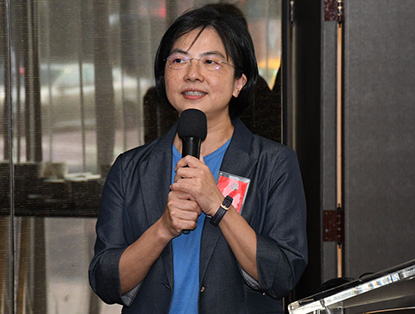 接著由國政會委員顏秀慧小姐主講「政策環境影響評估制度簡介」。主講人首先提到政策施行時可能遭遇鄰避情節 (NIMBY),因此立法的目的在於預防及減輕開發行為對環境造成不良影響。主講人也以淡北道路及敦南金融大樓環評為例,表示每個個案應整體考量進行政策可行性分析。主講人接著提到應實施環境影響評估之項目及政策細項,並表示政策環評部分僅徵詢委員意見,不會進入二階環評,相對寬鬆,但一般環評的流程則較為複雜,需包括審查、二階環評、公開說明會、製作評估書及舉辦公聽會等。所以,透過政策環評,可以促使政府機關進一步審視政策對國家未來的影響與是否適當。 接著由國政會委員顏秀慧小姐主講「政策環境影響評估制度簡介」。主講人首先提到政策施行時可能遭遇鄰避情節 (NIMBY),因此立法的目的在於預防及減輕開發行為對環境造成不良影響。主講人也以淡北道路及敦南金融大樓環評為例,表示每個個案應整體考量進行政策可行性分析。主講人接著提到應實施環境影響評估之項目及政策細項,並表示政策環評部分僅徵詢委員意見,不會進入二階環評,相對寬鬆,但一般環評的流程則較為複雜,需包括審查、二階環評、公開說明會、製作評估書及舉辦公聽會等。所以,透過政策環評,可以促使政府機關進一步審視政策對國家未來的影響與是否適當。
Next, Ms. Yen Hsiu-hui spoke on "Introduction of the Strategic Environmental Assessment system". The presenter began by noting that policies may run into the Not in My Backyard (NIMBY) during execution. The purpose of the law is to prevent and alleviate the environmental impact of development activities. The presenter also used the environmental impact assessments of Tamsui-Taipei Highway and Dunhua Financial Building as examples to illustrate the need for each project to undertake a holistic analysis on strategic feasibility. The presenter outlined what items and policy details should be assessed for environmental impact. She also stated that a strategic environmental assessment is relatively simple because it only asks the committee members for their opinions and does not go into the second phase of the environmental impact assessment. The standard environmental impact assessment process is more complex as it involves a written review, secondary environmental impact assessment, public explanatory meeting, preparation of an environmental impact assessment report, and public hearing. Strategic environmental assessments can help government agencies examine policies more closely to see if they will have a desirable effect on the future of the nation.
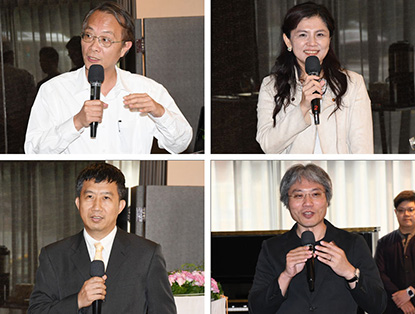 演講完畢,黃晉英秘書長代表基金會致贈謝禮予主講人。接著在與會者紛紛利用「餵豬時間」提出個人意見與看法互相交流後,圓滿地結束五月份國政聯誼會。 演講完畢,黃晉英秘書長代表基金會致贈謝禮予主講人。接著在與會者紛紛利用「餵豬時間」提出個人意見與看法互相交流後,圓滿地結束五月份國政聯誼會。
After the speech, Secretary General Huang Chin-ying presented a gift to the speakers on behalf of the foundation. Then, attendees expressed and exchanged their opinions and views during the piggy hour. The May Archilife Public Policy Communion ended smoothly.
|
|